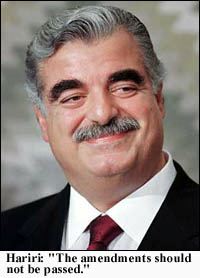 |
| Vol. 3 No. 8 | Table of Contents MEIB Main Page | August/September 2001 |
 |
However, this latest instance of Syrian intervention in the legislative process did not proceed as smoothly as Damascus would have liked. In the not-too-distant past, the Lebanese parliament would routinely vote with near unanimity to approve legislation backed by Damascus, a reflection of Syria's role in orchestrating parliamentary elections [see How Syria Orchestrates Lebanon's Elections in the August 2000 issue of MEIB] and its ability to threaten deputies with impunity . But this time around, dozens of parliament members abstained from the vote, while Prime Minister Rafiq Hariri and many others who voted for the amendments angrily acknowledged being "forced" to do so.
The original Criminal Procedures Law was approved last month by a vote of 80-3 by members of Lebanon's 128-seat parliament (45 members abstained or were not present), despite the vocal objections of President Emile Lahoud and Syria's allies in the judiciary and military-intelligence complex. The amendments to the law, introduced by Lahoud just days after the August 7 arrest sweep against opponents of the Syrian occupation, increased the maximum detention period pending criminal investigations from 24 to 48 hours and restored to Prosecutor-General Adnan Addoum certain discretionary powers that had been given to the Civil Appeals Court in the original draft of the law.
The fact that the vote was held at all was indicative of external pressure on the legislature. According to the existing legislative code, a law can be amended by parliament only after three months have elapsed since its official approval. However, only three weeks had elapsed since parliament approved the Criminal Procedures Law.
Another striking irregularity occurred at the beginning of the session, when Parliament Speaker Nabih Berri proclaimed the amended draft law to be an "urgent bill," allowing for its submission directly to the floor of the parliament without going through committees. Berri made the announcement without waiting to see if the required number of deputies had endorsed this classification, prompting Minister of State Bahij Tabbara to protest the move and, after a brief shouting match, leave the chamber.
 |
Druze leader Walid Jumblatt, who has been an outspoken critic of Syrian intervention over the last year or so, was outraged. "This amendment has been tailored to topple you," he told the premier. "Please, Mr. Prime Minister, don't hand power to a military clique. If President Lahoud wants to lead us to a military regime of secret services, we will not go along." With that, Jumblatt and his 15 parliamentary allies stormed out of the session.2
Most of the other 21 MP's who addressed the body registered similar complaints. Bassem Sabaa, a former information minister aligned with Hariri, called the amendments a prelude to "the militarization of the judiciary." Boutros Harb declared that the country was now run by a "totalitarian military regime." Several members of parliament pleaded with Berri not to cave into external pressure. "You and we have fought for an independent parliament, free of decisions [a euphemism for Syrian intervention]," Akram Chehayeb told the speaker. "It is very important that parliament remain this way."3
In the end, the amendments were approved as only seven MP's mustered the resolve to vote against the draft law, while 51 members abstained. Reaction to the vote among editorialists and political commentators was almost universally negative. "Parliament has turned its back on one of the few pieces of relatively progressive legislation it had produced in recent years, and one can only speculate on the tactics employed to bring about so crushing a setback for those who hope to one day see democracy in Lebanon," wrote Beirut's English-language Daily Star in a front page editorial the next day.4
However, what many Lebanese find most disturbing about this political spectacle is not the impact of the legislation on human rights abuses in Lebanon or the fact that pro-Syrian elites carried the day, but the fact that so many politicians who were openly critical of the amendments declined to vote according to their conscience. "There is evidently another master dictating to the legislators what to do and say," said Greek Orthodox Archbishop Elias Aoude. "Those who change their hearts so fast cannot be masters of their own selves. They are lackeys of another master."5
Notes
1 Al-Nahar (Beirut), 14 August 2001.
2 Al-Nahar (Beirut), 14 August 2001.
3 The Daily Star (Beirut), 14 August 2001; Al-Nahar (Beirut), 14 August 2001.
4 The Daily Star (Beirut), 14 August 2001.
5 Al-Nahar (Beirut), 16 August 2001.